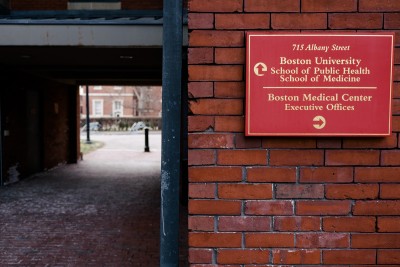
The Boston University School of Public Health Dean Sandro Galea and SPH Professor George Annas highlighted the United States’ future of public health in an article released Sunday as part of the SPH Dean’s Note series.
While public health efforts have led to tremendous achievements, both Galea and Annas wrote that they are concerned that society’s attention has not been aimed in the right direction and has slowed down the progress of efforts in public health.
Galea explained that the article was an effort to present a more holistic approach to the future of public health that builds on the history of the field.
“We were not aware of any papers that have approached public health as we do, with attention to our aspirations as a field that is concerned with the social, cultural, political, economic and structural conditions that produce health,” Galea wrote in an email.
With rapid progress that came with the development of technology, the dean’s note expressed concerns that the state of public health has diverged from what it is supposed to be, and proposed suggestions for future focus.
Annas said technology has the tendency to diverge the science of public health. However, the science of the field is what makes an effective public health system that allows people live healthier lives to begin with.
“Technology, or even the Internet, tends to make people look inward rather than outward,” Annas said. “Public health is about prevention, while the technology is about intervention. [Though] as a country, we are doing extremely well with technology. That is where all of the money goes — new medical machines, the drugs.”
The dean’s note outlined two core aspirations and four strategies for public health. The aspirations included broader cooperation between professionals from diverse sectors of the economy and a shift in focus toward improving living conditions for marginalized groups.
One of the strategies aimed to answer the fundamental and “time-specific” question of what matters most to the health of population, while another proposed to extend the reach from smaller-scale focuses to establishing “larger efforts that target foundational drivers.”
The article mentioned the Ebola outbreak as an example of how public discussion should be shifted away from concerns over the outcome of the outbreak, like having “tertiary hospitals and new pharmaceuticals to treat people,” toward emphasizing preventative precautions and foundational efforts that must be taken to ensure the absence of such outbreak.
Michael Grodin, a professor in SPH, said public health education focuses to address health issues in society while they are still resolvable.
“Public health works when nothing happens — when you have clean water, when you have food,” he said. “It is a failure when you start to have disease. People don’t see it until things fall apart.”
Prevention is key in effective public health measures and should be a larger topic of discussion in the public health field, Grodin added.
“The classic public health approach tends to look upstream as opposed to downstream,” he said. “Public health tends to the drowning person analogy. You want to see who is pushing people into the river. Prevention improves health, and it does not get enough social media attention for that.
Several students said widening public health conversations goes hand-in-hand with increasing public health knowledge to the public.
Kathryn Vessel, a senior in the Sargent College of Health and Rehabilitation Sciences, said public health awareness could contribute to an increased awareness of global issues.
“There is this common misconception that what happens in other countries does not matter because we cannot immediately see the effects and it does not affect us,” she said. “But as we have seen with the Zika virus, it does matter.”
Nikita Jain, a senior in the College of Arts and Sciences, said a change in national attitude is the most significant change to public health.
“In our country, we are just focused on treating the disease,” she said. “Preventative medicine is something that needs to be taken on and adopted.”
Lindsey Rateau, a sophomore in the College of General Studies, said public health is universally applicable and should have as much exposure as possible so people can keep themselves and others healthy.
“Different people with different backgrounds, cultures or genetic histories are vulnerable to different diseases,” she said. “It’s important to know how to stay healthy, prevent certain illnesses or prevent the spread of an illness that can lead to an epidemic.”























































































































